A (Real) Casino Gamer Looks At Paradise Springs
by SealWyf, HSM team writer
It was an unremarkable session of video poker — a mix of cash-eroding grinds punctuated by moderate surges. I was playing triple-play 9/6 Jacks or Better at the one-dollar level. This meant I was wagering fifteen dollars each hand. However, with correct play, you are only giving the house a 0.5% edge — one of the lowest in the casino. For this kind of money, you can be very sure I play correctly.
The Holy Grail of video poker is the Royal Flush: an Ace to Ten straight of the same suit. Of the approximately 2.6 million possible five-card poker hands, only four are Royals. You can expect a Royal Flush once in 44,000 hands of correct play. I had played four times that, since my last Royal. But this is probability — you can’t assume that something will happen any time soon, just because it’s overdue. Then the Ten, Queen, Ace and King of hearts were dealt. I held them carefully, mentally told the machine what I expected of it, and pressed the Draw button.
The first hand filled in with a Queen of Clubs, for a pair worth five dollars. The second line got the Nine of Spades — pure garbage. Then the third line filled in. Jack of Hearts. Lights went off behind my eyes.
After a perceptible pause, the machine confirmed the win: “Royal Flush 4000″. Lights flashed and cheerful music played. The machine locked up. Any jackpot over $1200 requires tax forms, which means a hand-pay. As I waited for the slot attendants, I basked in the afterglow of that glorious adrenaline rush. I pulled out my cell phone to let my companion know I had finally hit. I chatted with the passing patrons, accepting their congratulations. Yes, it’s a pretty one, isn’t it? Yes, four thousand dollars. Thank you, I hope you get one too.
This is why we gamble — these moments of mindless joy when we take moral credit for the output of a random number generator. These moments, as much as the cash, are the payoff for hundreds of hours of patient, skillful play and a considerable financial investment. If you are lucky, you get perhaps thirty seconds of ecstasy a year. Well, that’s why they call it gambling. More seriously, that’s why they call it addiction. And it’s why many people call it vice.
I’ve been a casino gambler for fifteen years now. I’ve played blackjack and craps, slots and Texas Hold’Em poker. But my game of choice is video poker. It’s a good game, and I play it well. It’s also extremely addictive — one of the most addictive games in an industry designed to encourage behavioral addiction. I am careful to keep my play cold-blooded, and to stay within my gambling budget. But I’m aware of the rush and the compulsion — the temptation to chase losses and raise cash limits, to go for broke in a game that, all too often, obliges.
I don’t do online gaming. And not just because it’s illegal. For me, it lowers the barriers too far, makes the risk too easy. The act of traveling to Las Vegas or Atlantic City sets a gambling trip apart from daily life, and imposes reasonable time and monetary limits. So, yes, it’s an addiction. But it’s a carefully managed one, a riding-the-tiger risky behavior, a flirtation with the dark side of the soul. And it’s one of the perks of being an adult.
Which brings us, finally, to Home. As a moderately high-stakes casino gambler, I had mixed emotions about the arrival of the Paradise Springs Casino. “Hey, there are children here!” I thought. Then, “They want us to spend real money?” It is only because real money is not returned that the Home casino is not real gambling. It’s a pay-to-play mini-gaming arcade, like the Midway. You are playing for a fixed ladder of rewards, and for fun. And, for a few high-rollers, a spot on the leaderboards.
You can almost hear the disclaimers: Nothing to see here, folks. We’ve checked with our lawyers. It’s okay. It’s not really gambling.
It just, sometimes, feels like it.
My second reaction, after that wave of moral queasiness, was a critical assessment of what Digital Leisure had gotten right, and what they had missed. Here, I’m somewhat handicapped — I consider myself a connoiseur of casinos, but my whole experience has been with American properties, most of them in Las Vegas and Atlantic City. The Paradise Springs developers are Canadian. Paradise Springs may be a literal quote of a Canadian casino, and I would miss the reference. But, one thing is certain: it’s definitely not in Vegas.
The joy of Las Vegas is its unapologetic tackiness. It’s Fantasy Land for adults, a celebration of excess with a large helping of sex. On the Vegas Strip, you can gamble in simulacra of Venice and Paris, ancient Rome and New York City, a couple of tropical islands, an Italian resort, and a medieval castle. Even when you leave the heavily themed properties, there is still a theme — “Generic Casino”, a one-stop emporium for all forms of adult entertainment, and an aggressive money-trap. Casinos have much in common with Home these days: they represent monetization gone wild.
Regardless of theme, casinos are much alike. Lights are low, immersing the player in a perpetual timeless twilight. Most of the light comes from the machines themselves, and they are everywhere. Real casinos are a maze of flashing, blinking, animated slot machines, with tiny enclaves of table games. This tells you where the revenue comes from — real casinos are all about slots.
They have evolved a lot in the past few decades, these machines. When I first started gaming, they were all reel-spinners — three to five physical reels where payouts were awarded by combinations of a few conventional symbols. In other words, they were like the slots in Paradise Springs.
But, while the Home slot inventory is decidedly retro, the real world has moved on. Most modern slot machines are video platforms, with animated symbols and many paylines. A typical video slot might have 45 paylines. And, although the denomination is nominally pennies, the total maximum bet is a hefty $4.50 wager every few seconds. Regular play is interrupted by bonuses, which can be a few free spins, or complex, multi-stage challenges that include a chance at a million-dollar regional progressive jackpot.
Slot themes are all over the map. The basic games may be similar, but thanks to computer and video technology, a platform can be re-skinned to appeal to any taste. A modern slot inventory is a window into the collective imagination. There are the old standards: wildlife, ancient Egypt, Asia, Medieval Europe, gemstones. Supernatural and fantasy themes are common, as are themes that hint at sex. Some slots have a quirky sense of humor. My personal favorite is “Invaders from the Planet Moolah”, in which cows in flying saucers abduct Earth cows and farmers.
Many games are based on licensed content — Monopoly and Wheel of Fortune themes are ubiquitous, but you can also play slots based on Tarzan, Godzilla, I Love Lucy, Star Trek, Star Wars, The Lord of the Rings, and hundreds of other commercially licensed properties. Licensing is big business, and slots based on popular TV shows and movies are usually crowded. In that respect, slot design is much like licensed mini-game and item design in Home. Themes that are already popular have a distinct advantage.
The visual chaos of the slot floor is mirrored and intensified by a chaotic web of sound. Each slot has its own sound effects, which now go far beyond classic reel-spinner bells and coin-clatter. Years ago, most slots were tuned to C-major chord, creating a unified golden haze of sound on the casino floor. Slot sounds have now diverged in all directions, and the golden chord is lost in a yammering cacaphony. Add to this the broadcast music, the frequent announcements, and the whoops of casino patrons, and you find yourself wishing for earplugs, or a very good iPod.
Contrast this with the open, well-lighted, blessedly quiet atmosphere of Paradise Springs. It bothered me the first time I visited the Concourse. Where were the flashing lights? Where was the garishly-patterned carpet? Where was the deafening machine-jangle? The pop music Musak? The drifting pall of cigarette smoke? Where were the skimpily-clad cocktail waitresses? (Actually, I know where those are — they’re over in x7.) Whatever this place is, it’s not a casino. It’s much too nice.
As a casino gamer, I like having a casino in Home. And I enjoy Digital Leisure’s take on a gaming property, although I have never been in one that was half as clean and wholesome. I would like some more creative slot implementations, and a separate video poker section. I don’t much appreciate the notoriously lossy Keno and Big Six games. No sane person plays them in real casinos. However, I find the poker and blackjack rooms to be total win — very nice implementations of table games I can no longer afford to play in real life. I think it would be nice if Digital Leisure installed craps and roulette as well, to fill out the table game offerings. And if they added a few strolling cocktail waitresses. They can borrow the code from x7.
However, I also find myself hoping that Digital Leisure does not make its casino too attractive. What goes on there may not be real gambling. But it can certainly feel like it. And, like it or not, there are minors present. It all feels morally slippery. Because gambling, or activities that feel like it, can be addictive.
Gambling addiction is not a metaphor. The physiology of addiction is the same for chemicals and pleasurable activities. In gambling addiction, the rush is not caused by a foreign substance, but by the body’s own chemicals of pleasure. You grind along in a game, through a series of petty disappointments. And, suddenly, the random number generator cooperates, and you win. A rush of pleasure fills the brain. That was nice, the brain decides. Let’s do it again. And so you continue, sometimes increasing the dose by increasing the wager, to keep getting the chemical payoff.
The pattern of random wins and unexpected pleasure in gambling has been shown to be deeply addictive. We joke about being addicted to video games and the Internet. And, indeed we can be. But add some random payoff to the mix, and the hook sets all the harder. Gambling addiction can ruin a life as surely as alcoholism or narcotics addiction.
I keep a careful watch on my emotions and my bankroll when I’m on a gambling trip. But I’m not sure that it is wise to expose young minds to the these games — games that have been carefully designed to extract as much money as possible from a real-world casino patron. Playing a well-designed modern slot machine can be a heady, and somewhat frightening, experience as you feel your judgement erode, and feed in “just one more hundred” to turn the game around.
I’ve felt similar emotions in Paradise Springs. There are times I have to tear myself away. There are times I am ashamed of my own lack of self-control, after all my years of practice, and my supposed maturity.
However, if I’m reading Paradise Springs correctly, Digital Leisure has the same concerns. Those slot machines are really not very well designed. The retro grid of conventional symbols, the absurdly simple bonus round — are these the best they can do?
Even more telling is the sound-pattern you hear while playing near the Blackjack room. Instead of the traditional uplifting C-major chord, the harmonics are in a minor key. It’s a depressing sound — it makes you feel heavy and unhappy, as if you are playing underwater. It’s almost as if Digital Leisure created a slot simulator that would discourage people from excessive gambling.
The developers’ editorial judgement is even clearer in the two personal spaces associated with the Casino. They are hotel rooms — a cheap “comped” room, and a more luxurious “VIP Suite”. They are among the most hilarious personal properties in Home.
The Comped Room is a visual quote of every cheap, tacky hotel room you have ever had the misfortune to inhabit. And that was just the beginning. The room has undergone a number of “upgrades”, including a few weeks flooded by a plumbing malfunction, a few more weeks of mildew, and the triumphant revelation of the view beyond the curtains — a blank, graffiti-sprayed brick wall. In the room’s most recent version, it has been burglarized. I’m looking forward to seeing what happens next.
The VIP Suite is, frankly, not much better. As a Home property, it’s fun. I’ve spent a lot of time playing with it. But is this really the best that Paradise Springs can offer its high rollers?
What Digital Leisure has done with these private spaces is stunning. The developers have, in effect, created an anti-advertisement for the associated public space. Casinos are greedy and tacky, these spaces imply. This ambivalent attitude is also apparent in the game rewards. They are a fixed ladder of items, a strategy I found puzzling at first, since the whole point of a Casino is open-ended rewards — risking money to win more money, and to rack up casino comp dollars. Surely something like a comp-dollar account, similar to Lockwood’s Sodium Credits, would have been more in keeping with the casino economic model.
Most of the prizes, especially at the lower levels, match the tacky aesthetic of the hotel rooms. There are several tee shirts, a poster showing a new car, and a discouraged-looking potted plant. Some of the rewards are not bad — I’m rather fond of the playing-card rug, and I look forward to winning the giant poker chip companion. But the general strategy seems to be to discourage excessive gambling. Move along, folks! Nothing to win here! Choosing not to play for them would be easy, if I weren’t also a Home reward addict.
So what are we to make of a virtual casino that goes out of its way to point out the moral shortcomings of real casinos?
My answer to that question has evolved over time. When I first came to Paradise Springs, I was puzzled and skeptical, and worried about the moral implications of a Home gambling simulator. But my current response is, “Enjoy it!” Paradise Springs has given us some well-crafted casino games, including the best poker room in Home. It’s also fun for those of us who know real casinos, providing a platform for semi-serious Home cultural analyses such as this one.
Paradise Springs is also evolving over time, perhaps in response to user feedback. There are now more slots in the Concourse. The dance music has improved, in my opinion. The new wishing fountain is an enjoyable, though expensive, option.
And, judging by the changed view of the Big Six room from the main Concourse, we are likely to get Roulette there in a future upgrade. Roulette’s not a bad game. It’s definitely an improvement over the boring, lossy Big Six wheels.
I see Digital Leisure as a company willing to invest some time and expense in improving its Home offerings. I still have some moral queasiness over a casino simulator in Home. But, as a simulator, it’s not as aggressive as it might be. As long as I stick to poker, I can turn a profit.
And, after all, it’s the responsibility of the individual player to supply some moral backbone. That’s probably the most accurate part of Digital Leisure’s casino simulation.
At this point, I think the “win” far outweighs the “fail”. And so I give Paradise Springs an approving 4.0 Bubble Machines. See you in the Poker Room!



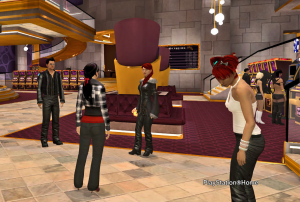
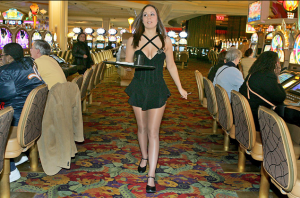
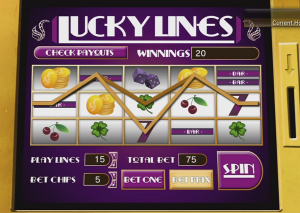
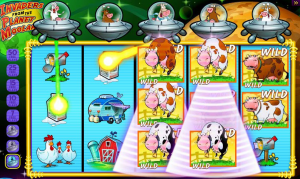
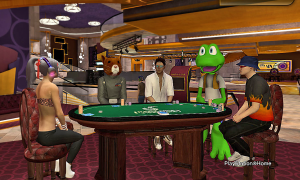
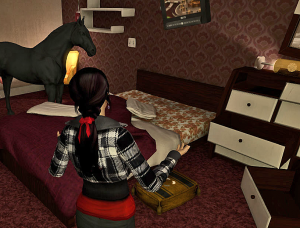
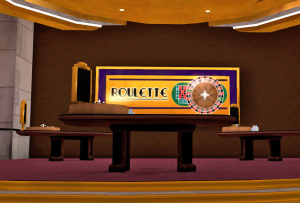



Well! Wasn’t that interesting. It certainly was. I ain’t likely to go gambling in a casino but the article on real and the digital casino was hard to not read so I didn’t not, I did read.
I did gamble in there once with the max chips allowed to be bought at one shot and I lost it all. No regrets. I wanted to see what it was like… to try to win but I lost.
Maybe I wouldn’t have had I read the article.
I like minor chords, not that I know one when I hear it, well sometimes I do.
Nice take on the casino from someone who has a way to compare it. I have never been in a casino in my life and doubt I ever will be. I am not a gambler at all, never got into it, but I do enjoy the games themselves like poker and blackjack. Since they started giving away free chips I have been going back to at least collect those each week. I like the fountain I got, it is a nice reward. Good read as always Seal.
Very nice article.
I have been to, and par-took of, in a real casino. I know my limits however in both. I am a cautious gambler in the real world. Turns out I am the same here, lol. It’s fun for me in both worlds nothing more nothing less. Good job Seal.
Thanks, all! It’s not often that my two gaming addictions come together.